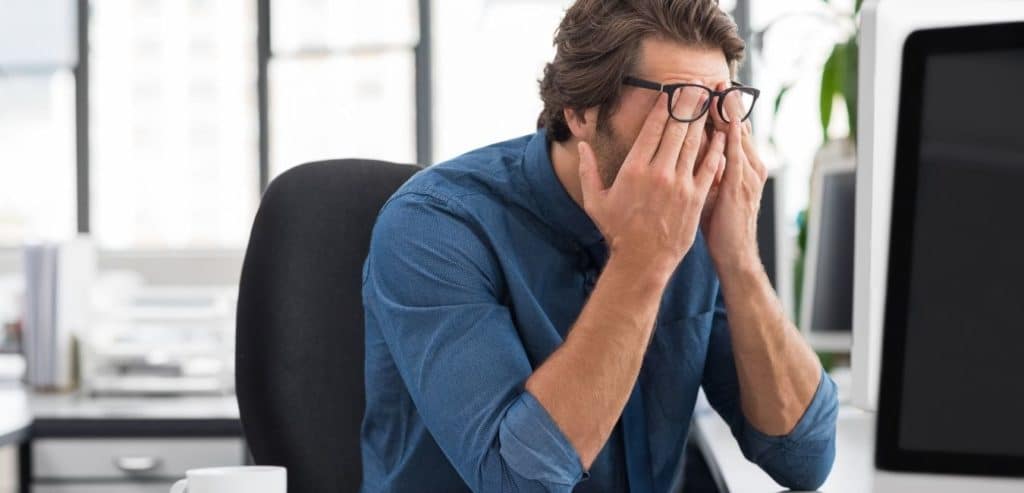Hemorrhoids that cause discomfort are fairly easy to spot, but the cause of hemorrhoids can feel like such a mystery. Do you feel that nothing you’re physically doing should cause such massive pain?
If you’re looking for one of the most common causes of hemorrhoids, you may want to consider stress as the source of your flare up. Stressors are incredibly widespread, whether it’s everyday deadlines making you anxious or headline after headline of maddening news, and they may be affecting you more than you think.
How can stress cause hemorrhoids exactly? Stress affects people in a number of ways and can cause everything from forgetfulness to anxiety to digestive problems, and it’s the latter that most acutely causes hemorrhoids. Digestive issues and related symptoms such as diarrhea and constipation are directly linked with hemorrhoid formation.1
To get rid of problematic hemorrhoids, it may be helpful to find ways to lower stress levels, and thus manage digestive problems, so in this article, we are going to try to understand stress, its causes, and why lower stress levels could be helpful to your body and your mind.
Who are we? We’re Doctor Butler’s, experts in down-there care of hemorrhoids and related conditions. We make proctologist-developed hemorrhoid ointments and complementary products to help you quickly leave the pain behind. Dr. Robert Cutler medically reviews all of the information here.
Originally published on July 23, 2022, this article has been updated to include instructions on how to use a sitz bath.
What Can Cause Hemorrhoids to Flare Up?
First and foremost, hemorrhoids are considered part of the normal human anatomy2 and there is no single cause of abnormal hemorrhoids. Hemorrhoids become a problem when veins along the wall of the rectum swell up, usually from excess pressure during stubborn bowel movements, heavy lifting or extra weight on your backside from obesity or pregnancy.
Signs of abnormal hemorrhoids include anal discomfort or a small amount of blood on toilet tissue. To know why stress can cause hemorrhoid problems, you may be surprised to learn that such acute symptoms are the ultimate result of such a wide-ranging cause.
The veins in the anal area are sensitive to changes in pressure, and there are many different causes and secondary effects of bodily changes that lead to hemorrhoids. A diet low in fiber, for example, can cause constipation. Difficult bowel movements as a result of constipation put a lot of pressure on the anal area, causing hemorrhoids.3
Here is a short list of the most common hemorrhoid causing issues:
- Low fiber diet
- Excess pressure from constipation or otherwise difficult bowel movements
- Pregnancy
- Obesity
- Activities or exercise which places excessive pressure on the hemorrhoid vessels such as heavy lifting, squats, and weightlifting
- Stress
How Does Stress Cause Hemorrhoids?

So, how exactly can stress cause hemorrhoids? The answer is that stress causes hemorrhoids indirectly. A body under emotional or physical distress can have many responses, as touched on earlier. Digestive problems, however, are a common response to stressors. So stress itself isn’t the cause of hemorrhoids, but stress-related digestive problems can be the culprit.4 “Can stress cause hemorrhoids?” is a good question, but it isn’t quite the one-to-one relationship that obesity and hemorrhoids have, for example.
Stress can create digestive issues, and that can cause hemorrhoid flare-ups.
Over or under-eating due to stress changes your diet, and your body may negatively react to that. Stress also changes how fast you are able to digest food, which leads to either constipation or diarrhea. The excess pressure on the anorectal area from constipation can lead directly to hemorrhoids; an inflamed rectum from bouts of diarrhea will worsen and slow hemorrhoids from healing.
If you happen to stress-eat lots of unhealthy foods regularly, you may not get the fiber you need to properly regulate your digestive system. And while it may seem basic, drinking plenty of water can be a challenge to a person preoccupied with stress.
What Causes Stress?

People experience stress for many different reasons. Stress is the body’s automatic response to danger, challenges or changes in your surroundings, and stressful situations cause a surge in your body’s production of certain hormones. This hormonal link explains a lot about how stress can cause hemorrhoids.
Adrenaline, for example, is one hormone produced at the first sign of danger. Adrenaline causes blood to flow to muscles and pupils to dilate, among other physiological factors that make up what’s known as the human and animal “fight-or-flight” response to perceived threats.
The fight-or-flight response is a perfect example of the usefulness of the body’s stress reaction. That surge of adrenaline is what allows you to quickly pull on your bike’s brakes to avoid an accident.
It may be unhelpful, however, for your heart to race every time you look at a bill or get into a disagreement with a friend, but we’ve carried that stress response with us into modernity. When stressors like bills or social pressures continue to weigh on you every day, your stress response system stays turned on, and chronic stress puts you at heightened risk for digestive problems (what we’re most interested in here), weight gain, heart disease and other issues.5
It’s good to have some methods to regulate stress levels on hand for the next time you’re feeling your heart start to race and your muscles tighten. We’ll go over some measures in the next section for controlling physical responses to stress.
Self Help Tips for Relieving Stress
If you’re wondering if stress can cause hemorrhoids, then you may have already ruled out pregnancy, obesity or something else as the cause of your problem.
Let’s think of stress-related hemorrhoids like the beast they are. Imagine a castle warding off an attack from a fire-breathing dragon (stick with me here). Your body is the castle, the stress in your life is the dragon, and your hemorrhoids are the burn of the dragon’s fiery breath.
Well, what’s our plan of action? We could shore up our defenses, reinforcing our castle wall to stop the dragon’s breath from hurting us, but it’d be best if we just went direct and lopped off the head of the dragon!
This is like what’s going on with hemorrhoids, stress, and your burned-out bum. Instead of constantly reinforcing the castle (treating the symptoms of your problems), we should do all we can to get rid of the dragon (deal with the core problem directly — stress).
Let’s go straight to the source and learn some tips for relieving stress. (Though you should definitely slap some Doctor Butler’s hemorrhoid cream or one of Doctor Butler’s other hemorrhoid solutions on your castle walls.)
1. Speak with a Licensed Therapist
A therapist can help you identify the causes of stress in your life, and then help direct you to overcome that stress.

2. Breathe Deep
Getting some extra oxygen can trigger a response in your brain to calm the rest of your body down.
3. Start Journaling
You may find that putting some thoughts to paper can help to sort the stressors in your life, and the task of writing alone can be a change of pace. If today’s your first day journaling, start with a topic about stress and write down a couple of things you’ve learned and would like to work on.
4. Workout and Exercise
Any kind of physical activity triggers the release of chemicals that leave you feeling good, and research finds that hemorrhoids and exercise are a great combination to help with both stress and hemorrhoids.6 Start with a few ten-second planks if you aren’t ready to leave the room. Schedule time to walk or ride bikes with a friend.
The Mayo Clinic has an extensive list of stress management tips that may be helpful to add to your routine.
What Helps Hemorrhoids Shrink?
As you work on decreasing your stress levels, you can fight your symptoms and reduce the pain and other symptoms of hemorrhoids. Working to reduce stress in combination with the following remedies are a powerful combination to fight hemorrhoids.
Increase Fiber In Your Diet
One of the most important ways to improve hemorrhoid health is by adding fiber into one’s diet. The best way to do this is through eating foods that have been found to help reduce hemorrhoid flare ups, like passionfruit, lima beans, green peas and avocado, but taking a fiber supplement can also be helpful.
The 2020 Dietary Guidelines for Americans recommends a high-fiber diet with two and a half cups of vegetables per day and two cups of fruit per day. Fruits and veggies are full of nutrients including fiber.
Over the Counter Hemorrhoid Remedies
Topical hemorrhoid treatments like Doctor Butler’s Hemorrhoid and Fissure ointment can help deal with pain and swelling instantly, helping you heal and focus your energy on stress relief.
Sit In a Sitz Bath

A common home treatment for soothing relief is a sitz bath soak. It won’t cure you of hemorrhoids – that’s what the stress management is for – but it’ll help to tamp down the uncomfortable symptoms.7
Fill a tub up with enough water to cover your anal area when sitting down and soak for up to 20 minutes. The warm water speeds up the blood flow to the affected area, quickening the healing process. If you’d like, add some epsom salt (bath salt) to help reduce swelling and itching. Air dry if you can, or gently dry with a soft cloth.
When suffering, try to draw a sitz bath every time you have a bowel movement, and add another in the morning and at night.
What Happens If Hemorrhoids From Stress Won’t Go Away?
Hemorrhoids make life difficult. When you’ve tried the ointments and home remedies and nothing seems to work, immediately seek help from an experienced doctor. There are usually less invasive medical procedures to remove or reduce hemorrhoids such as rubber-band ligation and laser, infrared, or bipolar coagulation, so don’t let the fear of surgery stop you from getting professional health information and treatment.8
However, if you’re at a place where your hemorrhoids are still manageable on your own, you can take steps now to avoid further problems by attacking the root causes of your pain. Eating right and working to relieve stress can help prevent hemorrhoids in the first place, as well as reducing the occurrence and shrinking the flare ups that you do get.
So why can stress cause hemorrhoids exactly? Stress can cause digestive issues, and that can end in hemorrhoid flare-ups.
It’s easy to forget how our emotional lives can impact our physical body so acutely, with digestive problems, and thus hemorrhoids, being such a common effect of stress. Stress can be good — in small doses — so don’t let it get out of control. Find ways to relieve your stress, through therapy, exercise, social activity or a good book, and help to rid yourself of some of the physical and emotional exhaustion of stress.
- Mönnikes H, Tebbe JJ, Hildebrandt M, Arck P, Osmanoglou E, Rose M, Klapp B, Wiedenmann B, Heymann-Mönnikes I. Role of stress in functional gastrointestinal disorders. Evidence for stress-induced alterations in gastrointestinal motility and sensitivity. Dig Dis. 2001;19(3):201-11. doi: 10.1159/000050681. PMID: 11752838. https://pubmed.ncbi.nlm.nih.gov/11752838/ ↩︎
- Fontem RF, Eyvazzadeh D. Internal Hemorrhoid. [Updated 2022 Aug 1]. In: StatPearls [Internet]. Treasure Island (FL): StatPearls Publishing; 2023. https://www.ncbi.nlm.nih.gov/books/NBK537182/ ↩︎
- Alonso-Coello P, Mills E, Heels-Ansdell D, López-Yarto M, Zhou Q, Johanson JF, Guyatt G. Fiber for the treatment of hemorrhoids complications: a systematic review and meta-analysis. Am J Gastroenterol. 2006 Jan;101(1):181-8. doi: 10.1111/j.1572-0241.2005.00359.x. PMID: 16405552. https://www.ncbi.nlm.nih.gov/pmc/articles/PMC7075634/ ↩︎
- Konturek PC, Brzozowski T, Konturek SJ. Stress and the gut: pathophysiology, clinical consequences, diagnostic approach and treatment options. J Physiol Pharmacol. 2011 Dec;62(6):591-9. PMID: 22314561. https://pubmed.ncbi.nlm.nih.gov/22314561/ ↩︎
- H. Mönnikes, J.J. Tebbe, M. Hildebrandt, P. Arck, E. Osmanoglou, M. Rose, B. Klapp, B. Wiedenmann, I. Heymann-Mönnikes; Role of Stress in Functional Gastrointestinal Disorders : Evidence for Stress-Induced Alterations in Gastrointestinal Motility and Sensitivity. Dig Dis 1 July 2001; 19 (3): 201–211. https://doi.org/10.1159/000050681. https://karger.com/ddi/article-abstract/19/3/201/94287/Role-of-Stress-in-Functional-Gastrointestinal?redirectedFrom=fulltext ↩︎
- Fontem RF, Eyvazzadeh D. Internal Hemorrhoid. [Updated 2022 Aug 1]. In: StatPearls [Internet]. Treasure Island (FL): StatPearls Publishing; 2023 Jan-. Available from: https://www.ncbi.nlm.nih.gov/books/NBK537182/ ↩︎
- Lohsiriwat V. Treatment of hemorrhoids: A coloproctologist’s view. World J Gastroenterol. 2015 Aug 21;21(31):9245-52. doi: 10.3748/wjg.v21.i31.9245. PMID: 26309351; PMCID: PMC4541377. https://www.ncbi.nlm.nih.gov/pmc/articles/PMC4541377/ ↩︎
- Albuquerque A. Rubber band ligation of hemorrhoids: A guide for complications. World J Gastrointest Surg. 2016 Sep 27;8(9):614-620. doi: 10.4240/wjgs.v8.i9.614. PMID: 27721924; PMCID: PMC5037334. https://www.healthline.com/health/hemorrhoid-banding ↩︎
